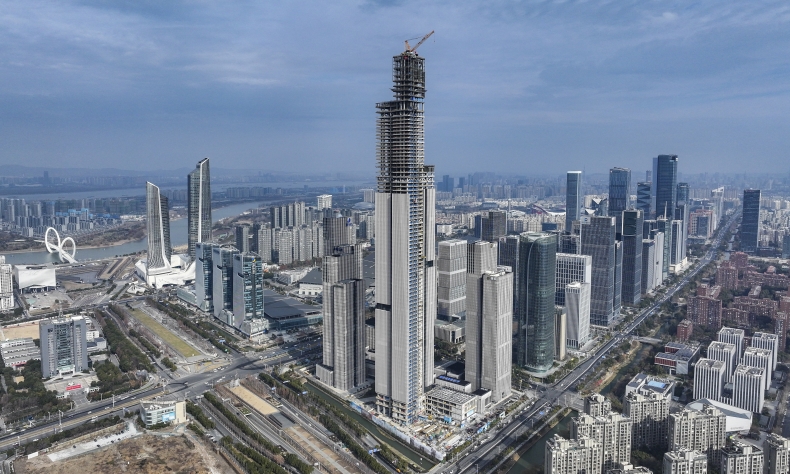Moving Firmly Forward

Deepening reform is an imperative for China to deal with the risks and challenges and seize the strategic initiative amid intensifying international competition.
Nearly five decades after the third plenary session of the 11th Central Committee of the Communist Party of China (CPC) in 1978, which launched the historic reform and opening up policy that transformed China, the CPC held another third plenary session that promises to be potentially as consequential. The resolution passed on 18 July during the third plenary session of the 20th Central Committee of the CPC calls for comprehensively deepening reforms, thus paving the way for the country to march towards the final goal of a developed and prosperous country.
Elaborating on the resolution, Chinese President Xi Jinping, who is also General Secretary of the CPC Central Committee, said it is to further deepen reform comprehensively with a focus on advancing Chinese modernisation and on implementing the major strategic plans set out at the Party’s 20th National Congress, which was held in October 2022.
The resolution charted systemic reform plans for an array of sectors ranging from building a high-standard socialist market economy and promoting high-quality economic development, to ensuring and improving the people’s well-being and deepening reform in the cultural sector.
It came at a time when the world is seeing changes not seen in a century, regional conflicts and disturbances are erupting, global problems are worsening, and external attempts to suppress and contain China are escalating. It has made deepening reform an imperative for China to deal with the risks and challenges and seize the strategic initiative amid intensifying international competition.
The resolution, with a commitment to pursuing high-standard opening up, has global implications, too. Recognising opening up as a defining feature of Chinese modernisation, the resolution reiterates China’s commitment to the basic state policy of opening to the outside world and readiness to continue to promote reform through opening up.
“Leveraging the strengths of China’s enormous market, we will enhance our capacity for opening up while expanding international cooperation and develop new institutions for a higher-standard open economy,” it said.
Greater openness
According to the resolution, China will steadily expand institutional opening up, promoting alignment with high-standard international economic and trade rules, and harmonise rules, regulations, management, and standards, in an effort to create an institutional environment that is transparent, stable, and predictable. It will also open its commodity, services, capital, and labour markets wider to the outside world and unilaterally open its doors wider to the world’s least developed countries.
China will further reform the management systems for inward and outward investment. It will foster a first-rate business environment that is market-oriented, law-based and internationalised, and will protect the rights and interests of foreign investors in accordance with the law.
It will expand the catalogue of encouraged industries for foreign investment, appropriately shorten the negative list for foreign investment, remove all market access restrictions in the manufacturing sector, and promote wider opening with regard to telecommunications, the Internet, education, culture, medical services, and other sectors.

Institutions and mechanisms for promoting foreign investment will be modified, to ensure national treatment for foreign-funded enterprises in terms of access to factors of production, license application, standards setting, and government procurement, and to support them on collaborating with upstream and downstream enterprises in industrial chains.
Measures will be taken to make it more convenient for people from outside the Chinese mainland to live, receive medical services, and make payments on the mainland. Improving the mechanisms for high-quality cooperation under the Belt and Road Initiative is also part of the agenda. Coordinated efforts will be made to advance both signature projects and “small but beautiful” public welfare projects.
Despite the growing external uncertainties, China will stay committed to reform and opening up, Mu Hong, deputy director in charge of routine work of the Office of the Central Commission for Comprehensively Deepening Reform, said at a press conference on the guiding principles of the third plenary session of the 20th Central Committee of the CPC held on 19 July. Regarding the reform and opening up policy as an important instrument that has enabled China to take great strides to catch up with the times, he emphasised the Party’s firm resolution and iron will to carry the reform further to its ultimate triumph.
“Experience has fully demonstrated that our Party’s unwavering commitment to advancing reform and opening up has been crucial. This approach allows us to remain sensitive to changes, respond to them with well-judged actions, adjust our approach when necessary, and actively navigate amid change,” he told the press conference.
Han Wenxiu, deputy director in charge of routine work of the Office of the Central Commission for Financial and Economic Affairs and director of the Office of the Central Rural Work Leading Group, confirmed at the press conference that China will continue to expand the use of foreign investment. Noting a recent decline in the actual use of foreign investment due to changes in the international environment, he said that it is a temporary phenomenon and that a range of measures will be rolled out to create premium conditions for foreign investment.
“We are willing to share the enormous opportunities presented by the development of China’s new quality productive forces and our journey towards Chinese modernisation. We look forward to witnessing foreign businesses grow together with the Chinese economy,” he said.
Powerhouse for growth
The third plenary sessions of the CPC Central Committees have focused on reform since the session in 1978 that launched the reform and opening up policy, putting China on a fast lane of development.
China has seen intensified efforts in reform in recent years, especially after the 18th National Congress of the CPC in 2012. In legislation, for example, out of the 303 laws currently in effect, 78, including major ones like the Civil Code, were enacted after the third plenary session of the 18th CPC Central Committee, according to Shen Chunyao, director of the Legislative Affairs Commission of the National People’s Congress Standing Committee. This period has also seen 334 amendments made to 147 laws.

Reform has played a key role in promoting China’s socioeconomic development. After the decision was made to deepen overall reform after the 18th National Congress of the CPC in 2012, major achievements have been made across various sectors. In the period from 2013 to 2023, China maintained a medium-high average annual GDP growth of 6.1 percent, contributing to over 30 percent of the world’s economic growth. With a total GDP of over 126 trillion yuan ($17.3 trillion), the size of China’s economy accounts for around 18 percent of the world.
In terms of innovation, China registered valid invention patents of over 4 million, the first country in the world to have reached that amount. Efforts to boost consumption as a main driver of economic growth have also seen substantial progress, with consumption accounting for 82.5 percent of economic growth in 2023. Urbanisation rate reached 66.16 percent by the end of 2013, which was 13.06 percentage points higher than 2012.
Solid progress has also been seen in green development, with the consumption of clean energy accounting for 26.4 percent of total energy consumption in 2023, 11.9 percentage points higher than in 2012, and China’s new energy vehicle sales ranking first in the world for the nineth consecutive year. From 2013 to 2023, the intensity of energy consumption dropped 26.1 percent, the fastest pace of drop in the world.
People’s livelihood has been greatly improved during the period. From 2013 to 2023, the average dispensable income of the Chinese people grew at a mean annual rate of 6.2 percent. Participants of basic old-age insurance reached 1.07 billion, with 1.33 billion people covered by basic medical insurance. China now has the world’s largest social security system.
Economic opening up has seen substantial progress. China’s trade in goods nearly doubled from 24.4 trillion yuan ($3.36 trillion) in 2012 to 41.8 trillion yuan ($5.75 trillion) in 2023, with number of participants in the Belt and Road Initiative rising to reach over 150 countries and 30 international organisations. From 2013 to 2023, 22 pilot free trade zones were set up across the country, which accounted for over 18 percent of foreign investment into China and foreign trade. Despite recent fluctuations, the actual use of foreign capital in 2023 was over $1 trillion, as compared to around $118 billion in 2013.
The resolution of the third plenary session of the 20th Central Committee of the CPC puts forward over 300 important reform measures, including those for achieving high-standard opening up. The resolution requires the reform tasks to be accomplished by 2029, which will mark the 80th anniversary of the founding of the People’s Republic of China.
Acknowledging the challenges ahead, Tang Fangyu, deputy director (ministerial level) of the Policy Research Office of the Central Committee of the CPC, expressed confidence in meeting the reform agenda if greater efforts in implementation are made. He emphasised the need to fully understand the requirements for reforms, make meticulous arrangements for implementation, clearly defined obligations and responsibilities for bodies involved, and strengthen supervision and oversight. He said that continuous efforts should be made until the goals are met.
“As long as the whole Party works with relentless persistence to ensure the implementation of deepening reforms comprehensively, we can take solid steps to build a great country and move towards national rejuvenation on all fronts through Chinese modernisation,” Tang said.
 Facebook
Facebook
 Twitter
Twitter
 Linkedin
Linkedin
 Google +
Google +










